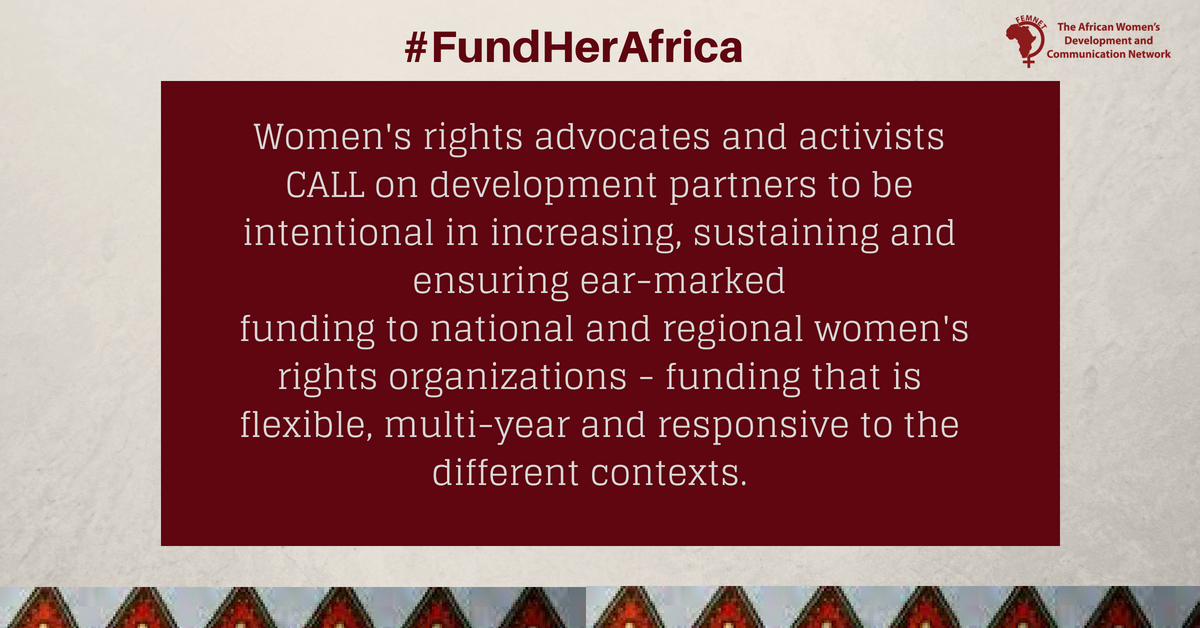
Communique: Call to #FundHerAfrica by East African Women’s Rights Organizations
COMMUNIQUE:-
From the 22nd to the 23rd of May 2018 thought-leaders from diverse women’s rights organisations (WROs) and feminists convened by the African Women’s Development and Communication Network (FEMNET) have expressed concern at the dwindling funds for WROs at the time these are most needed.
The leaders are calling on donors to reaffirm their commitment to goal number 5 of the 2030 Agenda on Sustainable Development (SDGs) and all global and continental commitments to gender equality and women’s empowerment, by “nailing their colours to the mast” through dedicated, flexible and multi-year funding streams for women’s rights movements, organising and advocacy with a target of 30% of their budgets allotted to women’s rights work.
Today, May 25, Africa Day, the women’s rights organizations are launching the campaign #FundHerAfrica for increased resourcing for gender equality and women’s rights from community (village) to regional levels.
WROs and international co-operating partners recognized that globally, the percentage of Overseas Development Assistance (ODA) that goes to women’s rights organisations has dropped from 1.2% of ODA to a paltry 0.5%[1]. A preliminary mapping of eight East African WROs revealed that average funding has dropped from $717,291 per annum in 2014 to $580,518 in 2017 (a 20% decline). A case study of Gender Links, a Southern African women’s rights organization also revealed that its income dropped in 2017 to one third of its 2014 peak. Many WROs reported that they are falling between the cracks – “too small for the big funds, and too big for the small funds”.
The meeting identified the following key challenges:
- Practical versus strategic: Many funding models are short term, project-based, crisis focused, at the expense of long term transformative and institutional development. This limits the ability and capacity of WROs to organise and sustain interventions that disrupt systems of power inequalities which require long and sustained funding.
- Limited efforts towards direct funding to local, national and regional actors in the global South without conditions and intermediaries.
- Bilateral funding is increasingly limited to international and inter-governmental agencies and government at both local and national levels leaving a small proportion to civil society organisations yet gender equality and women’s empowerment is very seldom a priority in national plans and budgeting. In addition, there is shrinking political civic space in the region, religious fundamentalism and harmful conservatism evidenced by clawbacks on gender equality and women’s rights.
- Consortium requirement: The development partners’ thrust towards joint ventures offers opportunities for developing new and meaningful partnerships, but also poses challenges with regards to the conditionalities that embody unequal power relations.
- There is a growing trend towards Public Private Partnerships (PPP) funding models as a new way of resource mobilization to finance development. However evidence of increased illicit financial flows and a lack of accountability by private sector to women’s rights remains a great concern.
- Private sector, philanthropy funding: While these present interesting new prospects, such funds often lack transparency; are driven by personal and profit-oriented agendas and relationships; and often conflict with the values of WROs.
Despite these challenges, the WROs recognized that the adoption of African Union Agenda 2063, Global sustainable development goals , declaration of 2010-2020 as the African Women’s Decade and the AU’s new Gender Equality and Women’s Empowerment (GEWE) strategy present opportunities to advance actions on gender equality and women’s rights on the continent.
WROs at the same time applaud efforts of Progressive governments and development partners in the global north, support to Women’s funds; Local & Diaspora Philanthropy and best practices of committed support to WROs like the leading from the South Fund created by four women’s funds and managed in Africa by the African Women’s Development Fund (AWDF) with the support of the Netherlands government; the lowering of the threshold by Amplify Change to enable southern-based WROs to apply; and the creation of the Women Voice and Leadership Fund by Canada.
The WROs call on development partners to:
- Increase, sustain and ensure ear-marked funding to WROs and collectives that is flexible, multi-year and responsive to the different contexts.
- Ensure that this is multi-year funding that includes core support to build strong institutions and movements that can sustain the work on gender equality and women’s rights.
- Promote localization mechanisms that enable funds to go directly to, and be managed by, African WROs and ensure autonomy in setting own agendas.
- Support institutional capacity building: including PR, finance, marketing, branding of the organisation as a whole.
- Support the processes behind consortium and coalition building and ensure equitable and respectable working relations.
WROs pledged to:-
- Strengthen the collective voice and building alliances with global feminist organisations; Create an African Women’s rights Reference group to provide strategic input into funding priorities.
- Ensure inclusive movement building for the involvement of all women and girls in all their diversity.
- Gather data to show the gaps and make the case for funding WROs, including through multi-media documentation of the work that WROs do.
- Scale up and explore new areas of funding, including online; public; private and philanthropy in Africa and the Diaspora, RECs and Intergovernmental agencies.
- Lobby and advocate for enabling national environments that respect civic space.
Follow and Engage online on Twitter @FemnetProg and hashtag #FundHerAfrica
For further information contact:
Crystal Simeoni, Head of Advocacy, FEMNET
Tel: +254 20 2712971/2; Cell: +254 725 766932 (off)
www.femnet.org
[1] OECD, Donor Support to Donor Organisations <https://www.oecd.org/dac/gender-development/OECD-report-on-womens-rights-organisations.pdf>
